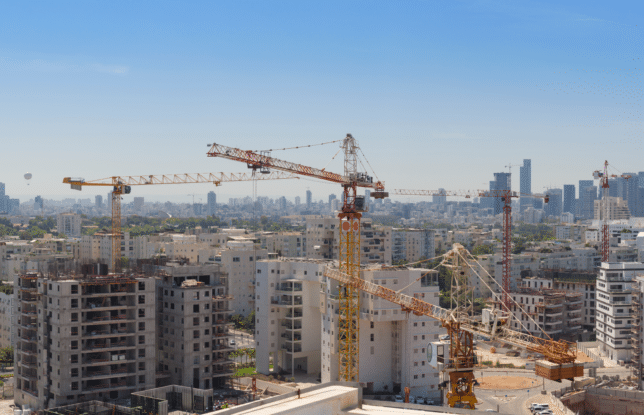Given the difficult reality that we find ourselves in, trying to make predictions for Israel real estate in 2024 is rather pretentious — nevertheless, we have tried. The high supply of housing together with limited demand indicates that in the first few months of the year, the moderate downward trend in prices will likely continue, however, this may well change throughout the year, as the economy recovers.
The year 2023 was anything but expected. Just a few days before it began, a new and right-wing Israeli government was sworn in, and no one could have predicted at the time the speed at which a political, social, and eventual economic crisis would develop, almost immediately thereafter. Together with the frequent interest rate increases, the housing market experienced a severe slowdown and a decline of tens of percentage points in the number of transactions. All this took place before the devastating events of October 7th dealt a severe blow to the country and the subsequent war that broke out.
Under such difficult circumstances, it is difficult, if not impossible, to predict what the new year will bring. At this stage, we do not know whether the conflict on the northern front will escalate, or how the anti-government protests, which may intensify after the war, will develop. These issues, among other things, can have dramatic implications for the real estate market. However, as the year gets started, there are some clear trends to pay attention to, especially for those considering a real estate transaction in 2024.
1. Housing supply
At the end of 2023, the supply of apartments on the market was very high. As 2024 was ushered in, more than 62,000 new homes are “on the shelf,” according to the Central Bureau of Statistics data from December. This is an unprecedented record figure. The reason for this is clear: during the real estate market boom in Israel, not long ago, between 2021 and 2022, developers and housing committees acted swiftly to increase the volume of construction, approving plans and issuing permits, but shortly thereafter, a severe slowdown began and the number of property transactions declined.
With this level of supply and a decrease in demand, it is surprising that the decline in prices in the housing market over the past year was only 1.3% and not sharper. As stated, we do not know how this year will continue, but based on the reasonable assumption that we will not see a boom in the market anytime soon, this figure supports a continued decline in prices during the first few months of the year.
2. Production power
One of the clear and immediate impacts of Iron Sword on the real estate industry in Israel was the scope of manpower employed in construction. On the eve of the war, around 100,000 Palestinian workers, 17,500 foreign workers from Moldova, Ukraine, and China, and tens of thousands of Israelis, most of them from Arab society, worked in the industry. Since the outbreak of war, Palestinian workers have been banned from entering Israel and several thousand foreign workers have left Israel out of fear for their safety.
The implication is clear: a sharp and severe slowdown in the pace of construction, with developers estimating that production is now 30% of what it was before the war. On some construction sites, the number of workers dropped and the pace of construction slowed down; on others, construction has come to an outright halt.
In response to the situation, the government increased the quota of foreign workers who can be employed in the industry from 30,000 to 50,000 and even approved bringing in the first ten thousand workers on a “fast track” without bilateral agreements with their countries of origin. Screening is currently underway to bring these workers from India and Sri Lanka, but as of this writing, the first workers have still not arrived, and it will take many months, probably between six and twelve, to reach the quota required to return the construction industry to full capacity.
To this, we must add the fact that after such a difficult year, the construction companies find themselves in great difficulty and many of them may not survive the coming period. A series of requests for a stay of proceedings have already been filed in recent months. The significance of this development is, of course, negative regarding the level of supply, but in the long term, as aforementioned, the market is characterized by a huge amount of supply.
3. Interest rates
One of the main causes of the slowdown in 2023, if not the main one, was the sharp increase in the interest rate, which began as early as April 2022. Within a year and two months, the prime interest rate jumped from 1.6% to 6.25%, significantly increasing the cost of mortgages and reducing the public’s ability to purchase homes. This is especially true in high-demand areas, where prices are high and require the middle class to take out heavy loans.
The first day of the year opened with good news in this regard, with an interest rate reduction of 0.25 percent by the Bank of Israel, to 4.5 percent, and a reduction in the prime interest rate to 6 percent accordingly. At this stage, this is a minor decline, but after such a long period of increase, it is a step that may well have stimulating psychological effects on the market.
4. Demand for homes
An obvious factor that directly impacts the housing market in Israel, is the population growth rate, which is the highest in the developed countries. During 2023, approximately 179,000 people were added to Israel’s population, a growth rate of 1.9%. The proportion of couples getting married each year is higher than in any other developed country, as is the rate of babies born. The implications for the housing market are clear, and it is reasonable to assume that after two or three months of shock and grief following October 7, the public will return to the sales offices, simply because it needs apartments.
However, when this happens, one must ask what their purchasing power is likely to be. At this time, as the war is still raging, it is difficult to gauge the extent of its impact on the economy. However, there are hundreds of thousands of households that have been, or are expected to be, affected financially. These include the self-employed and business owners, as well as their employees. The high-tech industry, which had also experienced a slowdown before the war, experienced a further decline in investment. In the past, the Israeli economy has demonstrated resilience and an impressive ability to recover, but even if this occurs this time as well, it will be overnight. Therefore, even on the day after the war, it can be assumed that the purchasing power of the Israeli public will not return to what it was before.
5. Foreign buyers
There are assessments that the void left by Israeli buyers will be filled by buyers from abroad. This is due to expectations of a large wave of immigration to Israel following the war, as a result of increased global antisemitism, and those buying a safe haven and/or wishing to get their money out of their country of residence. These assessments are based on an increase in interest as well as actual transactions recorded by real estate agents serving foreign buyers and developers.
In conclusion, the data indicate that at the beginning of 2024, the real estate market in Israel is characterized by a huge supply of homes, and limited demand, which will lead to continued moderate price declines at the beginning of the year. This is an opportune time for buyers and investors to scout attractive investment opportunities throughout the country. However, with declining output in the industry, supply will start to decrease, and accordingly, the downward trend in prices may eventually transform into a stable one.
There is strong speculation that when the economy shows signs of recovery, increased investments will be made in Israel and large numbers of immigrants will be welcomed at the airport, which could even cause an upward shift in the real estate market toward 2025.
Everybody wants a Buyitinisrael, now more than ever before. Whether you’re thinking about Aliyah, looking for a home or a haven, or want to support the Israeli economy, drop us a line, when you’re ready to talk. Whatever the reason, Buyitinisrael.







